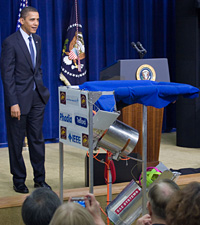Advertisement
Grab your lab coat. Let's get started
Welcome!
Welcome!
Create an account below to get 6 C&EN articles per month, receive newsletters and more - all free.
It seems this is your first time logging in online. Please enter the following information to continue.
As an ACS member you automatically get access to this site. All we need is few more details to create your reading experience.
Not you? Sign in with a different account.
Not you? Sign in with a different account.
ERROR 1
ERROR 1
ERROR 2
ERROR 2
ERROR 2
ERROR 2
ERROR 2
Password and Confirm password must match.
If you have an ACS member number, please enter it here so we can link this account to your membership. (optional)
ERROR 2
ACS values your privacy. By submitting your information, you are gaining access to C&EN and subscribing to our weekly newsletter. We use the information you provide to make your reading experience better, and we will never sell your data to third party members.
Policy
Jacobs Tells Industry To Protect Innovation
R&D is not the place to cut costs, executive director tells Pittsburgh meeting attendees
by William Storck
May 22, 2006
| A version of this story appeared in
Volume 84, Issue 21
Earlier this month, Madeleine Jacobs called upon several hundred chemical executives to keep U.S. research and development strong. The American Chemical Society executive director and chief executive officer was the keynote speaker at Pittsburgh Chemical Day, an annual event sponsored by chemical producers in the Pittsburgh area that brings together company representatives from around the country.
Jacobs focused on a couple of important questions regarding the future of U.S. R&D. These include: Where is the future generation of scientists and engineers who drive innovation in the chemical enterprise and the U.S. economy going to come from? If we are successful in attracting the "best and brightest" to study science and math, will there be jobs here in the U.S.? And is the world really flat, as stated in Thomas L. Friedman's best-selling book "The World Is Flat: A Brief History of the Twenty-First Century"?
The answer to the last question, she said, is "yes," citing the conclusions reached in Friedman's book: New technologies such as the Web are enabling India, China, and other nations to compete with or outcompete the U.S., Japan, and Europe; competition is no longer limited to manufacturing; competition is now focused on R&D; and the U.S. does not have a monopoly on talent as companies seek out the best minds, wherever they live.
Jacobs told the audience that the chemical and pharmaceutical enterprise and industry as a whole is sending our "best and brightest" a mixed message. "We have created a vicious cycle," she said. Industry calls for a more educated workforce in science and engineering, even as it lays off people and sends R&D functions overseas. Students hear what is going on, even see it in their own families, and they choose different career paths. "What happens next? Companies don't really have enough talented people domestically, so of course they have to get their innovation overseas. And the cycle becomes even more vicious."
Jacobs also noted that though the U.S once attracted the best and brightest minds from China, India, South Korea, Taiwan, and Japan, these countries have their own good university systems, and increasingly, they offer good job opportunities. In addition, the U.S. has become less welcoming to foreign students in the aftermath of the Sept. 11, 2001, tragedies.
"Something clearly needs to be done," Jacobs said. "I understand the pressures on industry to find cheaper, more reliable sources of energy; to have better tax incentives; and to be sure there is a reliable supply of talent. Companies have a commitment to their shareholders. And with raw material and energy prices skyrocketing, they are looking to cut costs. But let's not cut costs by cutting the talented people who are driving innovation. That is eating our seed corn and setting us on the path to being a second-rate nation."
Instead, Jacobs called on industry and others to work with legislators to press them for a coherent energy policy that makes it possible to continue to support innovation at home and to get tax incentives to help R&D in the U.S. "Let's get serious about energy R&D," she said, "and view the search for alternative energy sources as a true business opportunity that this nation can meet, that, indeed, the chemical industry can meet. Let's stop sending our kids mixed messages and start supporting the messages that we give them in our advertising: that chemistry is essential to life, to safety, to health, and to our prosperity."




Join the conversation
Contact the reporter
Submit a Letter to the Editor for publication
Engage with us on Twitter